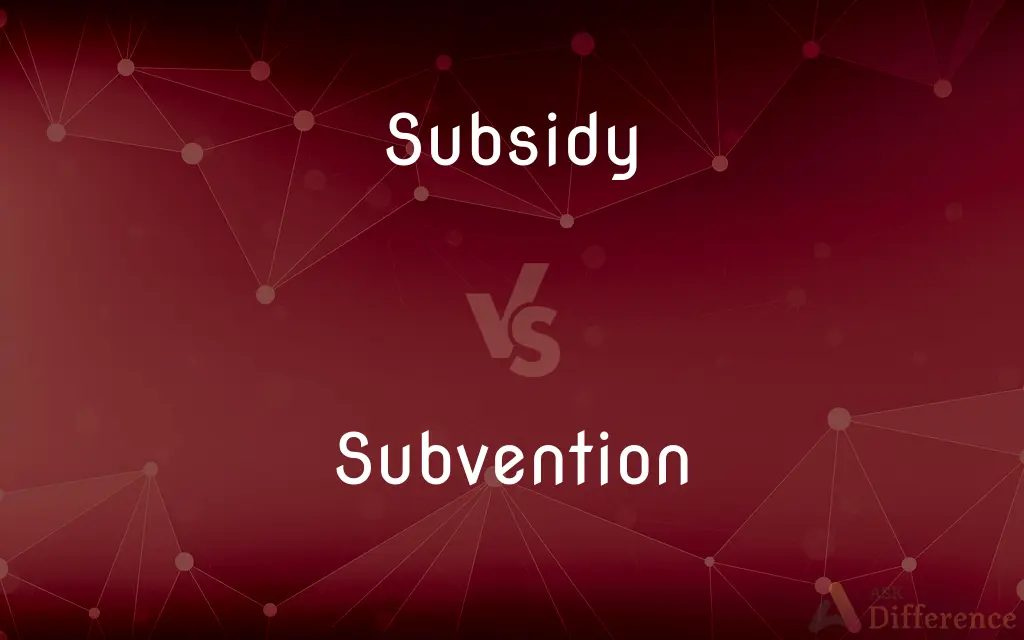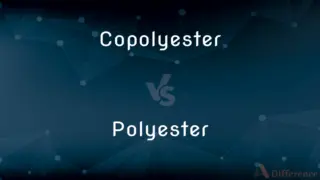Subsidy vs. Subvention — What's the Difference?
By Maham Liaqat & Urooj Arif — Updated on March 28, 2024
A subsidy is financial support from the government to encourage or support a particular economic activity, whereas a subvention is a broader term for financial aid or support, often from public funds to organizations.

Difference Between Subsidy and Subvention
Table of Contents
ADVERTISEMENT
Key Differences
Subsidies are typically provided by governments to support businesses, sectors, or activities deemed beneficial for the economy or society. These can include tax breaks, cash grants, or price supports. On the other hand, subventions can come from government bodies or international organizations and are directed not just towards businesses but also non-profit organizations, educational institutions, or local government units for various purposes including cultural, educational, or infrastructure projects.
While subsidies often aim to lower the cost of production, encourage investment in specific sectors, or reduce prices for consumers, subventions are used as a broader tool for financial assistance, which may not always be directly related to economic activities. Subventions might support social services, cultural programs, or research initiatives, reflecting a wider scope of objectives.
Subsidies are usually associated with economic policies designed to influence market outcomes—like boosting agricultural production or fostering renewable energy. In contrast, subventions may support activities that do not have immediate economic returns but are valuable for social welfare, cultural heritage, or scientific advancement.
The process of obtaining subsidies often involves compliance with specific economic criteria or performance benchmarks, emphasizing their role in economic planning and market manipulation. Meanwhile, subventions may be awarded based on social value, contribution to community development, or alignment with public policy objectives, showcasing a broader evaluation criteria.
While subsidies are a critical tool for economic policy, influencing production, consumption, and investment decisions within specific sectors, subventions represent a more flexible form of financial support, addressing a wider range of needs and objectives beyond the economic sphere.
ADVERTISEMENT
Comparison Chart
Definition
Financial support to businesses or sectors from the government.
Broad financial aid or support from public funds.
Primary Objective
To influence market outcomes and economic activities.
To provide financial assistance for various purposes.
Typical Beneficiaries
Businesses, agricultural sectors, renewable energy sectors.
Non-profits, educational institutions, cultural programs.
Forms
Tax breaks, cash grants, price supports.
Grants, loans, financial aid.
Evaluation Criteria
Economic criteria, performance benchmarks.
Social value, community development, public policy alignment.
Compare with Definitions
Subsidy
Support offered to businesses to promote economic activity.
Renewable energy companies often receive subsidies to become more competitive.
Subvention
Financial assistance granted to support organizations or activities.
The museum received a subvention for its educational programs.
Subsidy
A financial contribution by the government to reduce the cost of producing goods.
The government provided a subsidy to local farmers to stabilize food prices.
Subvention
A broader term for public financial support beyond the economic sector.
Local theaters often rely on subventions to operate.
Subsidy
An economic tool to adjust consumer prices and demand.
Subsidies on solar panels have made them more affordable to the public.
Subvention
Reflects a commitment to broader societal needs and development.
Subventions to public libraries ensure access to information for everyone.
Subsidy
A means to influence market dynamics and support national industries.
Auto manufacturing subsidies aim to preserve jobs in the sector.
Subvention
Aid provided to promote cultural, educational, and social projects.
Scientific research projects are sometimes funded through government subventions.
Subsidy
Assistance to sectors vital for the country's economic health.
The airline industry received substantial subsidies during the economic downturn.
Subvention
Support that can come from various public or international entities.
The health clinic was built with a subvention from an international fund.
Subsidy
A subsidy or government incentive is a form of financial aid or support extended to an economic sector (business, or individual) generally with the aim of promoting economic and social policy. Although commonly extended from the government, the term subsidy can relate to any type of support – for example from NGOs or as implicit subsidies.
Subvention
Provision of help, aid, or support.
Subsidy
Monetary assistance granted by a government to a person or group in support of an enterprise regarded as being in the public interest.
Subvention
An endowment or a subsidy, as that given by a government to an institution for research; a grant of financial aid.
Subsidy
Financial assistance given by one person or government to another.
Subvention
A subsidy; provision of financial or other support.
Subsidy
Money formerly granted to the British Crown by Parliament.
Subvention
(obsolete) The act of coming under.
Subsidy
Financial support or assistance, such as a grant.
Manufacturing firms are supported by government subsidies in some countries.
Subvention
(archaic) The act of relieving, as of a burden; support; aid; assistance; help.
Subsidy
(dated) Money granted by parliament to the British Crown.
Subvention
To subsidise.
Subsidy
Support; aid; coöperation; esp., extraordinary aid in money rendered to the sovereign or to a friendly power.
They advised the king to send speedy aids, and with much alacrity granted a great rate of subsidy.
Subvention
The act of coming under.
Subsidy
Specifically: A sum of money paid by one sovereign or nation to another to purchase the coöperation or the neutrality of such sovereign or nation in war.
Subvention
The act of relieving, as of a burden; support; aid; assistance; help.
Subsidy
A grant from the government, from a municipal corporation, or the like, to a private person or company to assist the establishment or support of an enterprise deemed advantageous to the public; a subvention; as, a subsidy to the owners of a line of ocean steamships.
Subvention
A government aid or bounty.
Subsidy
A grant paid by a government to an enterprise that benefits the public;
A subsidy for research in artificial intelligence
Subvention
To subventionize.
Subvention
Grant of financial aid as from a government to an educational institution
Subvention
The act or process of providing aid or help of any sort
Subvention
Guarantee financial support of;
The opera tour was subvented by a bank
Common Curiosities
How do subsidies affect the economy?
Subsidies can lower production costs, influence market prices, and encourage investment in specific sectors, affecting overall economic activity.
What is a subvention?
A subvention is financial aid or support, often from public funds, aimed at organizations, institutions, or activities for various purposes beyond just economic activities.
Can a subsidy be considered a type of subvention?
In a broad sense, yes. A subsidy is a specific form of subvention with a focus on economic support.
Can subsidies influence consumer behavior?
Yes, by making certain goods cheaper, subsidies can influence consumer preferences and demand.
Can individuals receive subventions?
While subventions are typically directed at organizations or institutions, individuals involved in cultural, educational, or social projects may benefit indirectly.
Are subsidies only provided by governments?
Primarily, yes. Subsidies are mostly governmental interventions aimed at supporting economic activities and sectors.
What is a subsidy?
A subsidy is financial support provided by the government to encourage certain economic activities or to support businesses and sectors.
Why are subsidies controversial?
Subsidies can distort market prices, lead to unfair competition, and sometimes benefit businesses at the expense of taxpayers.
Do subventions need to be repaid?
Generally, subventions do not need to be repaid as they are forms of grants or aid, but terms can vary depending on the source and purpose.
How do subsidies and subventions differ in their objectives?
Subsidies are aimed at specific economic outcomes, while subventions have broader objectives including social welfare and cultural development.
What types of activities can subventions support?
Subventions can support a wide range of activities, including cultural, educational, scientific research, and social services.
Who decides the allocation of subventions?
Government bodies, international organizations, or specific funding agencies decide based on criteria like social value and public interest.
How are subsidies and subventions similar?
Both provide financial support to achieve specific goals, whether economic, social, or cultural, often using public funds.
Who can apply for a subsidy?
Businesses, farmers, and organizations within sectors deemed important by the government can apply for subsidies.
What is the main difference between a subsidy and a subvention?
The main difference lies in their scope and objectives, with subsidies focused on economic support and subventions covering a broader range of purposes.
Share Your Discovery

Previous Comparison
Cyberterrorism vs. Cyberwarfare
Next Comparison
Copolyester vs. PolyesterAuthor Spotlight
Written by
Maham LiaqatCo-written by
Urooj ArifUrooj is a skilled content writer at Ask Difference, known for her exceptional ability to simplify complex topics into engaging and informative content. With a passion for research and a flair for clear, concise writing, she consistently delivers articles that resonate with our diverse audience.














































